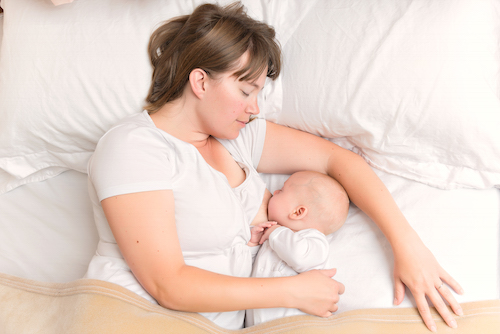A Guide to Safe Bed Sharing With Newborn
When you bring your newborn home, they will likely sleep in your room with you for the first few months. Many parents choose to bed share, or sleep in the same bed as their baby, but there are some risks associated with this practice.
To safely bed share with your newborn, make sure that your bed is firm and free of pillows, blankets, and other soft objects.
You should also avoid drinking alcohol or using drugs before sleeping.
If you’re a new parent, the thought of sharing your bed with your newborn may seem daunting. But bed sharing can be safe if you take some precautions. First, make sure that your bed is firm and that there are no pillows or blankets that could potentially block your baby’s airway.
You’ll also want to keep a close eye on your baby while they sleep in your bed never leave them unattended. If you’re breast-feeding, bed sharing can actually help you to establish a good milk supply. And it can be a bonding experience for both you and your baby.
Just be sure to take all the necessary safety precautions and always put your baby’s safety first.
How to bed share safely
Can I Share a Bed With My Newborn?
As a new parent, you may be wondering if it is safe to share a bed with your newborn. The answer is yes! In fact, the American Academy of Pediatrics (AAP) recommends that parents sleep in the same room as their baby for at least the first six months of life.
There are many benefits to sharing a room with your baby, including:
- improved bonding and attachment
- increased breastfeeding success
- ease of night feedings and diaper changes
- peace of mind for both parents Of course, there are also some safety considerations to keep in mind when sharing a bed with your baby.
- The AAP recommends placing your baby on his or her back to sleep, using a firm mattress, and avoiding pillows, blankets and other soft objects in the bed. You should also avoid smoking and drinking alcohol while sleeping in the same bed as your baby.
When Can Babies Safely Bed Share?
The practice of bed sharing, or co-sleeping, has been around for centuries. In recent years, however, there has been a lot of debate surrounding the topic. Some experts believe that bed sharing is dangerous for babies, while others say it can be beneficial.
So, when can babies safely bed share?
There is no definitive answer to this question. It depends on a number of factors, including the age and health of the baby and the sleeping arrangements of the parents.
Bed sharing is generally not recommended for newborns or premature babies. These infants are at a higher risk for Sudden Infant Death Syndrome (SIDS).
If you do choose to bed share with your baby, there are some safety precautions you should take.
Make sure the mattress is firm and free from pillows, blankets, and toys. Do not smoke or drink alcohol before going to sleep. And always put your baby on his or her back to sleep.
With these safety measures in mind, bed sharing can be safe for both you and your baby. It can promote bonding and help your baby feel secure and comfortable at night.
Can Bed-Sharing Cause Sids?
There is no definitive answer to whether bed-sharing can cause SIDS. Some research suggests that there may be a correlation between the two, while other studies are inconclusive. The American Academy of Pediatrics (AAP) advises against bed-sharing, as it increases the risk of SIDS and other sleep-related infant deaths.
However, some parents choose to do so anyway, either out of necessity or preference. If you do decide to bed-share, there are some safety precautions you can take to minimize the risk:
- Make sure your mattress is firm and free of pillows, blankets, and other soft objects.
- Place your baby on their back to sleep.
- Don’t smoke or use drugs while bed-sharing.
- Be aware that bed-sharing with an infant under four months old carries the highest risk of SIDS.

Credit: rednose.org.au
Bed-Sharing Death Statistics
According to a study published in the journal Pediatrics, bed-sharing is associated with an increased risk of infant mortality. The study found that infants who shared a bed with their parents or other caregivers were more than twice as likely to die during their first year of life than those who slept in a crib.
The study’s authors say that while the absolute risk of death for bed-sharing infants is low, the practice should be avoided because it significantly increases the risk of Sudden Infant Death Syndrome (SIDS).
They advise that parents and caregivers should never sleep with an infant under four months old, and that babies should always sleep on their backs.
While the findings of this study are concerning, it’s important to keep in mind that the overall risk of SIDS is still relatively low. According to the National Institutes of Health, there are about 2,500 cases of SIDS in the United States each year.
So while bed-sharing may increase your baby’s risk of dying from SIDS, it’s still a very rare event.
Safe Sleep 7 Bed-Sharing
It’s no secret that new parents are often sleep-deprived. So it’s no surprise that many turn to bed-sharing, or co-sleeping, as a way to get some much-needed shut-eye. After all, what could be easier than snuggling up with your baby in bed?
But is bed-sharing safe?
The answer is complicated. While there are some risks associated with bed-sharing, there are also some benefits.
Here’s what you need to know about Safe Sleep 7 and bed-sharing. Safe Sleep 7 is a set of guidelines for safe sleep practices put forth by the American Academy of Pediatrics (AAP). According to the AAP, babies should always sleep on their backs on a firm surface in a crib or bassinet with a tight fitting sheet.
Bed sharing is not recommended under any circumstances. The main reason why the AAP does not recommend bed sharing is because it increases the risk of Sudden Infant Death Syndrome (SIDS). SIDS is the leading cause of death for infants one month old or younger and most cases occur when babies are between two and four months old.
SIDS is thought to be caused by an underlying medical condition that makes it difficult for infants to regulate their body temperature or breathing patterns. When babies share a bed with adults, they are at an increased risk of suffocation from pillows, blankets, or even an adult’s body weight. In addition, babies who share a bed with adults are more likely to end up in dangerous positions like face down on their stomachs which can further increase the risk of SIDS.
However, there are some benefits to bed sharing that should be considered before ruling it out entirely. For instance, studies have shown that babies who share a bed with their parents have less anxiety and cry less than those who don’t. Additionally, breastfeeding mothers who share a bed with their infants report getting more sleep overall than those who don’t because they can nurse without having to get out of bed multiple times during the night.
And finally, bed sharing can create a stronger bond between parent and child which can have lasting effects into childhood and beyond.
Bed-Sharing With Baby Benefits
We all know the importance of a good night’s sleep. And when we’re talking about babies, that need is even greater. Unfortunately, sometimes it’s hard for parents to get their little ones to sleep through the night.
But there may be an answer: bed-sharing with the baby! Benefits of Bed-Sharing With Your Baby There are actually many benefits to bed-sharing with your baby, including:
1. It can help your baby sleep better. When you share a bed with your baby, you can provide the comfort and security they need to fall asleep and stay asleep throughout the night.
2. It can help you bond with your baby. Bed-sharing gives you the opportunity to snuggle and cuddle with your little one, which can promote bonding and attachment.
3. It can make breastfeeding easier. If you’re breastfeeding, bed-sharing makes it much simpler to nurse your baby during the night since they’re right there next to you.
4. It can save you time (and money). You won’t have to waste time rocking or walking your baby to sleep if they’re already snoozing next to you in bed!
5. It can give you peace of mind .
When your baby is sleeping in bed with you, you’ll always know exactly where they are – no more worrying about them rolling out of their crib or getting stuck somewhere!
Co Sleeping Killed My Baby
I’m a firm believer that co-sleeping killed my baby. I believe this because when we bed share, it’s very easy to become careless and not pay attention to things like pillows, blankets, etc. that could potentially suffocate our baby. Also, studies have shown that there is an increased risk of SIDS when babies sleep in the same bed as their parents.
For these reasons, I think it’s important for parents to be aware of the dangers of co-sleeping and make the decision not to do it.
Safe Sleep 7 Debunked
There’s a lot of information out there about how to keep your baby safe during sleep, and it can be tough to sort through it all. So we’ve decided to debunk some common myths about safe sleep for babies.
Myth #1: Babies should always sleep on their backs.
Fact: While it’s true that sleeping on the back is the safest position for babies, it’s not always possible or practical. If your baby is struggling with back sleeping, don’t worry
– just make sure they’re comfortable and safe in whatever position they end up in.
Myth #2: You need to use a special mattress or crib for your baby.
Fact: Any firm, flat surface will do
– you don’t need to buy a special mattress or crib. Just make sure there are no pillows, blankets, or toys in the bed with your baby.
Myth #3: Baby monitors are essential for safe sleep.
Fact: Monitors can give you peace of mind, but they’re not necessary for keeping your baby safe during sleep time. As long as you check on your baby regularly (at least every few hours), you’ll be fine without a monitor.
Is It Safe to Co Sleep With a 1 Year Old?
It is safe to co sleep with a 1 year old as long as you follow some basic safety guidelines. Make sure that the bed you are using is firm and that there are no gaps between the mattress and the bed frame. You should also remove any pillows, blankets, or stuffed animals from the bed so that your child can’t become tangled in them.
Additionally, it’s important to keep your baby on their back to reduce the risk of Sudden Infant Death Syndrome (SIDS). If you have any concerns about co sleeping with your 1 year old, talk to your pediatrician.
Conclusion
Although bed sharing with a newborn may seem scary, there are ways to do it safely. Always put your baby on their back to sleep, use a firm mattress, and keep pillows and blankets away from your baby’s face. You should also avoid drinking alcohol or taking drugs before bed.
If you smoke, quit smoking. Bed sharing can be a great way to bond with your baby and get some much-needed rest. Just be sure to do it safely.

